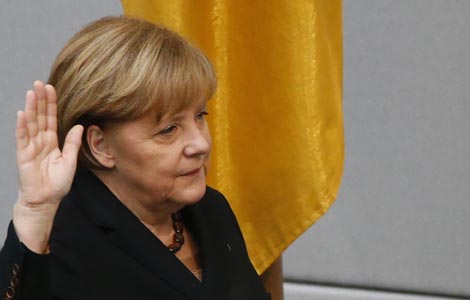

BRUSSELS - Euro zone finance ministers made progress on Wednesday on some details of a plan to close banks, paving the way for completion of a euro zone 'banking union' that is to restore confidence in the financial sector and boost growth.
More than five years into a financial storm that toppled banks and dragged down states from Ireland to Spain, Europe wants to seal its biggest project since the introduction of the euro - a framework to police banks and tackle their problems together.
German Chancellor Angela Merkel underscored the importance of the negotiations to complete the banking union, saying she hoped the ministers would reach a deal before she and other EU leaders meet on Thursday.
"For the acceptance of the euro on financial markets, the banking union is very important," Merkel said on Tuesday.
That gives finance ministers 36 hours to clinch overall agreement on an agency and fund to shut weak banks to complement European Central Bank supervision of the sector if European Union leaders are to sign off on it this week.
A crucial part of the project was agreed in the small hours of Wednesday after seven hours of talks - how to ensure financing for closing down banks.
This agreement boosts chances of an overall deal on the blueprint on dealing with failing lenders later on Wednesday - in time for the deadline set by Merkel and other EU leaders and boosting chances the reform will become reality in 2015.
Under the agreement, banks will provide the cash to pay for the closure of failed lenders, giving roughly 55 billion euros ($76 billion) over 10 years accumulated in a Single Resolution Fund.
Until then, however, if there is not enough money from the fees, governments will be able to impose more levies on banks. If that does not suffice, they would help with public money.
If a government would not have enough money, it could borrow from the euro zone bailout fund ESM, like the Spanish government did to recapitalise its banks in 2012, according to the deal reached by euro zone finance ministers.
"In the transitional period, bridge financing will be available either from national sources, backed by bank levies, or from the ESM, in line with agreed procedures," a draft statement by euro zone finance ministers said.
This is a victory for Germany, which was reluctant for euro zone countries to share the costs of winding down banks elsewhere in the euro zone for as long as possible.







